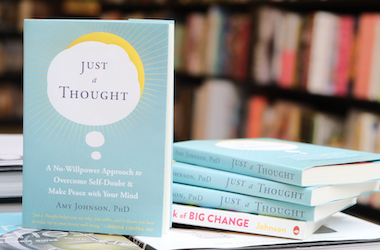Below is the Foreword I wrote for a book called Victim of Thought: Seeing Through the Illusion of Anxiety by Jill Whalen. 
***
What if—regardless of how anxious you feel—you are 100% healthy and well?
The first time I heard that question, I thought the person asking it was insane. “YOU certainly don’t have complete mental health to propose such a crazy idea!” I thought.
I, perhaps like you, had struggled with a lifetime of anxiety and panic. I had a binge eating habit and was somewhere in the process of “kicking” several other destructive habits.
I was clearly not sitting in perfect mental health.
But then a funny thing happened. As I was feeling shocked and somewhat offended by the idea of myself being 100% healthy and well, I also felt a wave of peace wash over me.
I found my mind was a little quieter; my heart a little more open. Something about the idea that we are fundamentally well by default, but are simply experiencing a steady stream of our own (sometimes anxious) thinking, felt right.
What if—regardless of the intensity of your anxiety (or depression, addiction, compulsions)—you are a healthy person simply experiencing anxious, depressed, and/or addictive thinking?
What if anxiety doesn’t come from the world around you? What if it doesn’t come from school or work, a change in schedule or lifestyle, or the people around you who seem to drive you nuts?
What if anxiety is your own moment-to-moment thinking masquerading as reality?
I realize these questions might sound a little crazy to you right now. They did for me when I first heard them. Yet the fact that you’re reading this book means you’re open to hearing something different. And as Jill mentions many times throughout Victim of Thought, having an open mind and seeing what feels right to you, is the key to feeling better. Don’t take my word or Jill’s word for it. But as you read this book, hold these ‘what ifs’ loosely, and test them against your own feelings of truth.
I know the idea that you are healthy underneath your own steady stream of thinking is not what you were lead to believe. And it’s certainly not what you may have heard from traditional psychology either.
But what if the premise of this book is true?
What if outside events really don’t cause our stress and anxiety?
What if freedom from anxiety is a simple matter of—as the subtitle of this book suggests—seeing through the illusion of thought?
I’ve certainly found this to be true in my own life. And I’ve seen it to be true for the thousands of people I’ve served in my private practice as a psychologist and coach.
The new paradigm for psychology that Victim of Thought points to, is replacing old, outdated models. It is leading people worldwide to deep and lasting freedom, where many other methods have fallen short.
My clients come to me experiencing anxiety, habits, and addictions. The changes they experience after learning what Jill points you towards in this book is incredible. It’s no longer a question of them learning to cope with anxiety. They become truly free of it.
I am thrilled that Jill wrote this relatable, accessible book that will bring this new understanding of the human experience to many more people.
You are far more resilient, far closer to peace of mind and living your best life than you think you are (the italics are important there).
Hold that as a ‘what if’ as you read Victim of Thought and see what you come to discover.
Amy Johnson, Ph.D.
Author of The Little Book of Big Change: The No-Willpower Approach to Breaking Any Habit and creator of The Little School of Big Change





